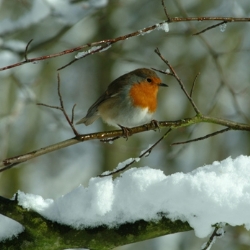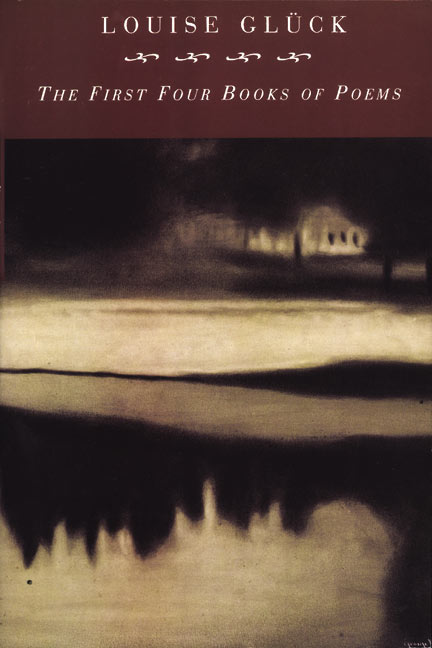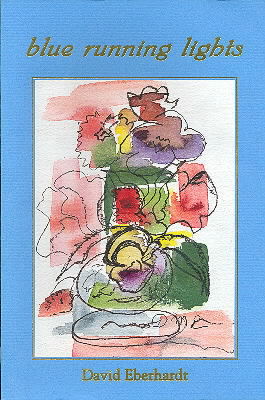
|
Christopher T. George is co-editor of Loch Raven Review. George was born in Liverpool, England in 1948 and now
lives in Baltimore, Maryland, near Johns Hopkins University, with his wife Donna and two cats. Chris works full-time as
a medical editor in Washington, DC. He has been writing and publishing poetry since he attended Loyola College,
Baltimore, and studied with Sister Maura Eichner at the College of Notre Dame, as well as with poets Elliot Coleman
and Marion Buchman. His poems have appeared in numerous publications in the United States and Great Britain. He is
also a published historian and a lyricist for a new musical,
Jack-The Musical, about Jack the Ripper.
George also is the Editor of
Desert Moon Review and an editor at
Writer’s Block Poetry Workshop.
|
Winter 2006 Table of Contents - Vol. II, No. 2 |
|
|
Christopher T. George
Louise Glück, The First Four Books of Poems, Ecco Books, an imprint of HarperCollins Publishers, ISBN 0880014766, 240 pages, 1990, $15.00.
The late great Stanley Kunitz described Louise Glück’s poems as “delicately intense, spun out of fire and air, with a tensile strength that belies their fragility.” This book gathers together works from the poet’s first four poetry books: Firstborn (1968), The House on Marshland (1975), Descending Figure (1980), and The Triumph of Achilles (1985). As such, the book serves as a fine introduction to the poet who replaced Billy Collins as the twelfth Poet Laureate of the United States in fall 2003. Certainly, Ms. Glück (pronounced “Glick”) should be counted one of the major modern American poets. And considering the skyrocketing prices of books these days, this ample volume is a steal at the cover price of $15.00. In fact, when I looked in on Amazon recently, the book was discounted to $10.95. Now, who could resist that? Glück’s verse is earthy and down-to-earth and magical at the same time as in the following sample, “The Chicago Train” (p. 5), the first poem from Firstborn, a realistic and somewhat disturbing snapshot view of an American family: The Chicago Train Across from me the whole ride Hardly stirred: just Mister with his barren Skull across the arm-rest while the kid Got his head between his mama’s legs and slept. The poison That replaces air took over. And they sat – as though paralysis preceding death Had nailed them there. The track bent south. I saw her pulsing crotch. . . the lice rooted in that baby’s hair. As can be seen from “The Chicago Train,” Glück has the ability to enchant us and repel us at the same time. In her characteristically simple and accessible verse, she exposes the bones within the human psyche, as in the following poem from the later book, The Triumph of Achilles, a more intensely personal poem (pp. 189–90): The Reproach You have betrayed me, Eros. You have sent me my true love. On a high hill you made his clear gaze; my heart was not so hard as your arrow. What is a poet without dreams? I lie awake; I feel actual flesh upon me. meaning to silence me— Outside, in the blackness over the olive trees, a few stars. I think this is a bitter insult: that I prefer to walk the coiled paths of the garden, to walk beside the river glittering with drops of mercury. I like to lie in the wet grass beside the river, running away, Eros, not openly, with other men, but discreetly, coldly— All my life I have worshiped the wrong gods. When I watch the trees On the other side, the arrow in my heart is like one of them, swaying and quivering. Moving verse, yet delivered simply. It is a triumph of American poetry from the poet who is presently writer in residence at Yale University. Highly recommended.
Octopus Dreams: Poetry in Baltimore Anthology One, Edited by Dan Cuddy, Julie Fisher, Leslie F. Miller, Men Maa Aim Ra, Tanefa Wallace, and Edgar Whitehair, Abecedarian Books, ISBN 0-9763106-9-4, 76 pages, 2006, $12.00.
This anthology, a product of the Poetry in Baltimore website run by co-editor Julie Fisher, contains an excellent taste of what the city on the Chesapeake has to offer poetry-wise as well as art-wise. Included are a number of the leading verse writers in the Baltimore area such as veteran poets Clarinda Harriss, Dan Cuddy, Barbara Simon, Joe Fanzone, Chris Toll, and Rosemary Klein, along with a good sampling of newer names on the city’s poetry scene, each versifier represented by one poem each. Forty-four poets and eighteen artists are represented. The artwork is in black and white inside a jazzy pop art slick cover with a pink octopus and magenta reverse designed by Justin Sirois. The tentacled back cover entices the reader to open the book to read. Clarinda Harriss, longtime Professor of English at Towson State University, offers the nostalgic “Green & Fairbanks” – a lively romp of seven sextets with ending couplet, each sextet having a witty rhyme to the fifth and sixth lines – about a scamp of a girl who steals on a regular basis from the local greengrocer. Here’s the fifth sextet: When I got out of bed it was mid-summer. My father’s Big Boys were green, but his Early Girls filled the yard with their hot red smell of sweat. For three whole July days I employed my skill to smuggle tomatoes into the baskets yawning under Green & Fairbanks’ steamy awning. An interesting cross-over between the poets and artists is Mark “Wireman” Coburn who is represented both by his wire sculpture “Anemone” from 2002, listed as a 26-inch by 20-inch bust of what might be a Dadaesque representation of a favorite aunt with piled up hair and spiral breasts! – and by the following illuminating poem (Freud might have a field day!): Self Portrait Piercing eyes that are mined and ready to explode. The subject I see in so many ways, hair now long and beard shaggy. It is me and in my mind I can see it so easily, yet the outcome is inevitably born on canvas. Surreal observations are one of the trademarks of Chris Toll’s verse: Life in Heaven You know what you’re getting with most poems before they even ring the doorbell. We are not written in stone, we are written in light. Emily buttons her black skyscraper and strolls through the blizzard in a hymn. A life-size Nativity scene occupies the cab of a recreational vehicle parked behind a laundromat. You fasten a thunderbolt in your hair, kiss me on the lips, and say, “I think I’ve been alone too long. The sunshine is so blue now it heals my heart. I’d tempt Fate – if Fate weren’t a stranger to me.” More down to earth – almost!!! – is this thought-provoking offering from co-editor Dan Cuddy: About Birds Perhaps What do I want to do? That’s an open-ended question, but I want to turn the twitter of birds to rock that will withstand eons of wind, rock, bake. I want a pie of bird-chips and ways to look from this angle and that, and “have” my observations, the facts of time and space, great abstractions, duly noted, indelible as that morning chittering is now as the sun rises for the nth-teen day of my sparrow life. A worthy and entertaining anthology with a number of clear highlights and defining moments, though somewhat mixed in quality as local anthologies often are. The book, as noted, provides a welcome taste of the Baltimore poetry and art scene, though one might wish that the better poets such as Harriss and Cuddy were represented by more than one poem. Also the black and white photography does not do the artwork justice since we must assume that many if not all of the paintings are actually in full emblazoned color if we were to see them in person. Thus many of works here, shown in black and white appear but a fraction of themselves – though the art does add to the book even so. A couple of the paintings – by Ryan Higgins and Paul Abbey – depict Loch Raven Reservoir, from which our magazine derives its name. Another reason to recommend the book. Beware the Baltimore Octopus, you might be enthralled!
David Eberhardt, blue running lights, Abecedarian Books, ISBN 0-9763106-9-4, 76 pages, 2006, $15.00. I bought a copy of Mr. Eberhardt’s latest book at the Baltimore Book Fair this past September under a blazing hot sun at publisher Alan C. Reese’s stall under Baltimore’s famous Washington Monument, the great pillar to the first President of the United States, the first major monument built to the great leader, Virginian, and general. Mr. Eberhardt and I are also veterans, not of war and federal politics like G. Washington, but of the Baltimore arts scene, and David inscribed the book in a silver flair pen, “To my man Chris – our area fixture”! Although I should qualify that statement. For David was an outspoken critic of the Vietnam War – and he was imprisoned in Lewisburg Federal Prison for pouring blood on draft files in 1967 with the late Father Philip Berrigan and two others. That activist background and his Catholic upbringing helps to inform Eberhardt’s verse as well as the tradition of the Beats. As in other Beat-influenced poetry, there is a certain untidiness in Eberhardt’s work but also a classical, epic sheen to it, as in the following opening poem to the book: PREAMBLE, SELMA, ALABAMA, CIVIL RIGHTS MOVEMENT Homage to Wallace Stevens Police cannot become, there are Aubades then just a pause For hope, it’s Filled in by their badge, A kind of ache, a silver ruse. The dawn So full of grainy light, its Flux of light like marl – A dream of bits and pieces, Swims under “the law”, is gone. Then it’s daylight clear. “Here comes the law.” The cops, who always “are: Never “appear;” The ideals Behind your protest may seem real. . . Cops ARE! But this collection has much more to offer than just political poetry and dire topics. There is much beauty and insight and above all humor and lightness. He can also show beauty and profanity in the same poem, as shown in the following: LIKE A STEADY SENSE OF SHINING My lover approaches Kind of a Eastern woods Butterfly, A Buckeye, A meister, e.g., Texture de meerschaume, Wings the color of Dusk in limes, In cocoa, Somehow brushy and Bushy, Wings flopping Invitational, Mahogany burnished, A roan color With great blue spots Jupitorious, Atmospherically, Changing color like breathing From dusk blue to light purple I am deeply Moved how your Cunt seats Just a pinch but So deeply, Hung Like a bell, Breasts deep also, Tilting forward Quite a little. Now I’m walking In pine woods Silver before Spring That old shed smell. The butterfly Another brand new lover, Like that trail head Down into Haleakela crater, or On its ridge, Silverswords, past Timberline, cloud line even, Then the descending Switchbacks, Just that bright, And that cold. David Eberhardt is a unique voice on the Baltimore poetry scene, an informed voice both in terms of his background and the wide array of cultural influences that his poetry displays. I would wish that he did not use those shouty all-cap titles, which is bad enough for each poem but is on the annoying side in the list of contents, but on the other hand the book is sumptuously presented, the poetry displayed on ivory hardback-quality stock, the textured light blue cover with gilt author’s name and title, and an attractive abstract painting of a flower arrangement in full color by the poet's mother, artist Dorothy Mack Eberhardt. There are two color illustrations of paintings in the text of the book as well.
Robert Alexander, Rasputin’s Daughter, Ecco Books, an imprint of HarperCollins Publishers, ISBN 0-670-03468-1, 304 pages, 1990, $23.95.
Perceptive readers of Loch Raven Review may remember that I reviewed Robert Alexander’s previous book, his 2003 title, The Kitchen Boy, for our Summer 2006 issue. That prior novel was told from the perspective of a boy who supposedly worked in the kitchen of the Ipatiev House in Yekaterinburg, the last residence of Tsar Nicholas II and his ill-fated family when they were imprisoned before their hurried execution by the Bolsheviks on the night of July 16, 1917. Mr. Alexander approaches the bloody events of Revolutionary Russia from another perspective in his new book – from the viewpoint of the elder daughter of the “mad monk” from Siberia, Grigori Efimovich Rasputin (ca. 1870–1916). The story of the monk’s spiritual administrations to the hemophiliac heir, Tsarevich Aleksei, a fatal flaw in the Romanov dynasty, is well known, as is the story of Rasputin’s bloody murder by jealous Russian nobles on the night of December 16, 1916 – exactly seven months before his imperial patron, the German-born Tsarina Aleksandra, met her fate. Even if the story is well known, novelist Alexander breathes welcome new life into the tale and in fact makes Rasputin a flesh-and-blood figure and a fascinating one at that. Who knew that Rasputin was a family man? The man from a poor village in Siberia (“Rasputin” actually means a crossroads in Russian as we are told) had a wife back in their home village taking care of a mentally retarded son, Dmitri, while the couple’s two daughters Maria and the younger Varvara lived with the Siberian shaman and Dunya, his plump housekeeper and (as we find out in an episode that shocks Maria) his mistress. The scenes of domesticity with the healthy-appetited holy man gorging on jellied cod’s heads and other peasant delicacies and Maria’s alternate revulsion with the rustic ways of her father and affection for him drive home the humanness of both daughter and father. The mystic shunned meat and sweetmeats such as cakes and pastries and only ate fish, although he did drink gallons of Madeira wine. Fish, he believed, led to spirituality that enabled his incredible healing powers, giving him the ability to heal the Tsarevitch and countless noble and ordinary Russians as well. It was in fact a mistake of Prince Felix Yusupov, the noble delegated to assassinate Rasputin in his riverside palace, to try to poison the holy man with cakes laced with cyanide that delayed the end of the peasant. He drank the cyanide-laced Madeira but shunned the cakes, as per his practice. Finally Rasputin had to be shot and thrown in the River Neva to finish him off. One of the mysteries of the novel and the real assassination was whether he was still alive when thrown in the river. Novelist Alexander does an excellent job at evoking the atmosphere of intrigue and corruption in St. Petersburg, renamed “Petrograd” during the war with Germany that had raged for two years, in the waning days of the Romanov dynasty, in that dark and snowy Russian winter. The palace intrigues, the plots of the Bolsheviks and other revolutionaries to overthrow the Tsar’s government, and the secret underground groups of Christians and satanists made for worrying times for Maria and her family. But Rasputin went blithely on, holding audiences with petitioners, including noble women who would throw off their clothes in front of him to be “healed.” Alexander cleverly does not make it clear whether Rasputin had sex with these women or, as he is shown to have done with a prostitute, simply to get them to strip to expose himself to temptation and thus ramp up his spirituality. The confusion of Maria over exactly what his father was – a dilettante, a holy fool, or a wise and generous holy man who helped everyone he could – transfers to the readers who are likewise confused but intrigued by this strange man. Also who is the young man, Sasha, who espouses love for Maria, remarkably a lover of the great Russian poet Alexander Blok’s work, just as she is? She meets him on a riverboat on their way back to their Siberian home. Is he an innocent young man or did he really have something to do with the assassination plot against her father in their Siberian village when a woman plunged a dagger into Rasputin’s stomach? He was certainly with the ravaged-faced woman when the incident occurred, although he professes his innocence when he later sees Maria. Why is Sasha hanging around at odd hours around in the alleyway and entrance of the apartment building where the Rasputins live? Why do the security guards, who are supposed to be providing protection for the family, keep disappearing? And after her father’s death (much of the novel being in flashback), what role does the poet Alexander Blok play in the revolutionary government’s “Thirteenth Section” investigating Rasputin and his contacts? Rasputin’s killer, Prince Felix Yusupov, who is portrayed as a fop and a homosexual lover of Grand Duke Dmitri, who was believed to have been also involved in the assassination of Rasputin, may or may not have tried to have sex with the shaman. There is also the possibility that Rasputin might have spurned Prince Felix, which partly might have led to his demise. In any case, the holy man told his daughter that if dark forces conspired against him, it was “God’s will.” The novel rattles on to its final climax, carrying the reader with it all the way as if being transported along the dark, snowy streets by a horse-drawn troika.
© Christopher T. George |
|



